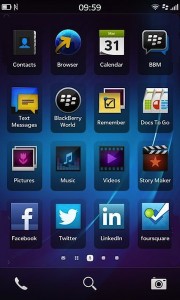 The company formerly known as RIM, whose claim to fame is the BlackBerry smartphone line, has changed their name to BlackBerry. I, for one, am entirely ecstatic about this, as this will be the last sentence I will ever write explaining that RIM is the company that makes the BlackBerry. Most people had no idea who RIM was, they just assumed the company was called BlackBerry. Apparently, RIM finally got the hint. Oh, and by the way, the company also finally released their long-delayed and somewhat-anticipated new smartphone platform, the BlackBerry 10.
The company formerly known as RIM, whose claim to fame is the BlackBerry smartphone line, has changed their name to BlackBerry. I, for one, am entirely ecstatic about this, as this will be the last sentence I will ever write explaining that RIM is the company that makes the BlackBerry. Most people had no idea who RIM was, they just assumed the company was called BlackBerry. Apparently, RIM finally got the hint. Oh, and by the way, the company also finally released their long-delayed and somewhat-anticipated new smartphone platform, the BlackBerry 10.
I long ago wrote off RIM, er BlackBerry, as dead. Once they announced they were delaying BB10 until after the 2012 holiday season, I called Time of Death. Truly, last year was their only chance at capitalizing on a new platform, and by missing the holiday season, they effectively lost an entire year. Assuming there even is room for a 3rd place competitor in the mobile device market, BlackBerry will be fighting for table scraps against Microsoft and there really won’t be any winners in that war.
By and large, most pundits agree that BlackBerry’s chances are extremely slim. But if you follow the technology industry at all, or if you are exposed to people in the technology industry, you will read or hear some positive reviews as well as some arguing that BB10 will save BlackBerry. Let me summarize why none of this matters, especially to consumers and small business owners.
While I haven’t had any hands-on with a BB10 device (the devices won’t be released until March or April), many reviews are positive regarding the BB10 user experience. I won’t argue those points. The real question should be is BB10 so much better than its competitors that it will cause a huge defection from people using iPhones or Android-based phones? Almost certainly not. Especially considering that changing phones will mean the loss of purchased apps for that platform, and in the case of the iPhone, a move away from the iTunes ecosystem. BB10, just like Microsoft’s Windows 8 phones, will have a huge challenge fighting the inertia of the installed user base of the iPhone. Evidence shows Android phone users are not as loyal, so they might gain some adopters from that platform, but not likely much of any consequence.
Why should you care if BlackBerry has a large marketshare? The reality is that most developers will not put the effort into writing Apps for a platform without a sufficient user base to profit from. But without quality Apps, a platform will not attract a large user base. It’s a chicken-and-egg problem that BlackBerry just doesn’t have the time or financial resources to overcome. Microsoft maybe, but even that’s to be seen.
One train of thought I’ve seen from technology writers is that the BlackBerry 10 will be a hit among its traditional stronghold of corporate IT departments. They claim that IT departments will be eager to upgrade the BlackBerry devices they currently deploy to their corporate users. This might be true, although there is also a chance that IT departments will be slow to adopt the entirely new BB10 platform, either because they want to take the time to thoroughly test it or because they aren’t convinced of its future. Even assuming that IT departments like the BB10 platform, the reality is that it simply doesn’t matter.
First, corporate smartphone users, who used to make up the vast majority of the market in The Old World of Technology, now make up a fraction in The New World of Technology. Consumers and small business owners now rule the roost, and they have all but forgotten about BlackBerry. Second, because of this consumerization of the technology market, the Bring Your Own Device (BYOD) movement is spreading rapidly across the corporate IT world. In a nutshell, BYOD is the idea that employees are expecting that their workplaces will support the use of their personally-owned technology devices, such as smartphones. By and large, these devices are iPhones – not BlackBerry phones. And by and large the movement is so strong that corporate IT departments have little choice but to comply with their users’ wishes. The era of corporate IT dictating smartphones to their users has passed. The idea that corporate IT will have any significant influence on the smartphone market is wishful thinking.
The bottom line is that if BlackBerry’s only hope is in corporate IT, then they have almost no chance at all. The era of trickle-down technology, where small business and consumers waited to see what technology shook out from big business, is over. Since small business and consumers drive The New World of Technology, BlackBerry has simply become irrelevant. BB10 is BlackBerry’s last gasp before they sink below the surface; don’t get dragged down with them.